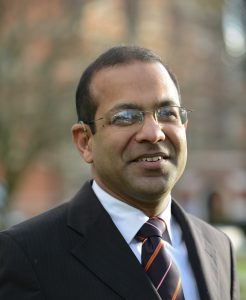The Pancreatic Cancer Research Fund Tissue Bank (PCRFTB), which launched in 2015, aimed to solve the research challenge of high quality pancreas tumour samples being so scarce in the UK. The longer term ambition was to widen the scope of who could request samples, but this was dependent on sufficient sample numbers being collected. This milestone has now been reached, with over 3,500 pieces of pancreatic tumour and normal pancreas tissue donated and stored.

Professor Hemant Kocher
Says PCRFTB Director Prof Hemant Kocher (pictured right): “We are really proud of this achievement and extremely grateful to the patients who have made this possible.”
Furthermore, highly skilled tissue bank technicians are able to divide these anonymised ‘parent’ samples into smaller portions known as aliquots. This technique means that there are in fact over 20,000 samples stored, along with other biological materials such as plasma and serum (both products derived from blood samples), urine and saliva – all of which are valuable for research.
Alongside these patient samples are hundreds of samples of blood, urine and saliva donated by PCRF supporters at our supporter conferences, which are used for ‘healthy control’ comparison against patient samples.
The Tissue Bank has a small core staff based at Barts Cancer Institute, London, who liaise with the seven partner hospitals across London, Leicester, Southampton, Oxford and Newcastle upon Tyne.
Each of the partner hospitals has a dedicated Tissue Collection Officer (TCO), and the international expansion is in large part thanks to their work. TCOs discuss tissue donation with relevant surgical patients to obtain their consent for their removed tissue to be stored. They also ensure that the samples are processed to strict protocols and gather some 300 pieces of data about the patient, their medical history and treatment to date, which is key to the samples being such high value for research.
“Every piece of tissue donated is very precious,” says Tissue Bank Co-ordinator, Catherine McMaster-Christie, “and the consistency of data gathered by TCOs across all sites ensures we know as much as possible about each sample. The more information we have, the more that researchers using the tissue for their research can be sure that the sample is exactly what they need to accurately answer the research questions they are asking.”
In addition, the Tissue Bank’s Research Technician, Ahmet Imrali, uses special techniques to produce additional resources called ‘patient-derived tissue samples’, such as ‘organoids’. These are patients’ cells that have been specially nurtured to grow into tiny 3-D structures. Very difficult to produce, and highly valuable for research, they enable much more accurate insight into the disease and how potential treatments might work in the body than traditional 2-dimensional cell lines allow.
Says PCRF CEO Maggie Blanks, “The PCRF Tissue Bank has been our largest single investment to date at £2.4M – made possible thanks to our supporters. We aimed to accelerate UK research and have been rewarded by seeing the Tissue Bank grow into a resource for the global pancreatic cancer research community, with all knowledge generated from our tissue samples being collated and freely available to all. We are incredibly proud of this achievement.”
